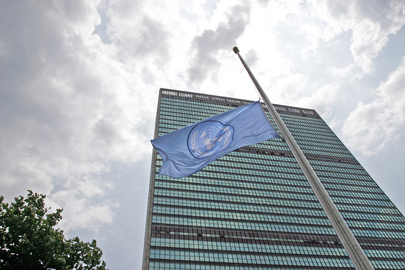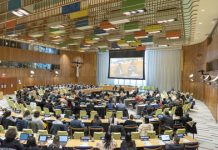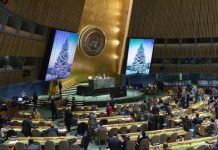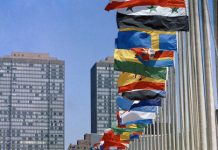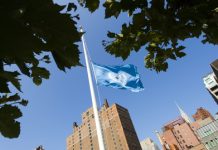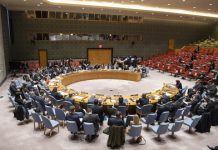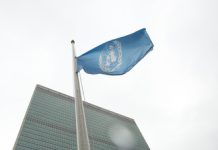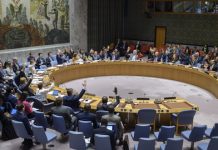Farhan Haq, UN Deputy Spokesperson, stressed the need for unimpeded relief operations and a peaceful path out of crisis.
“The UN remains concerned by ongoing violence in Myanmar, including aerial bombardment hitting civilians and civilian infrastructure,” he said, at the regular press briefing in New York.
“Civilians and humanitarian workers must be protected.”
His remarks come as monsoon rains and flooding – worsened by Cyclone Wipha – swept through parts of the country, further straining regions already destabilized by conflict and a devastating earthquake in March.
Millions forced to flee
The crisis left more than 3.3 million people internally displaced, with another 182,000 seeking refuge abroad since the military coup in February 2021, according to the latest UN figures. In addition, over 1.2 million – mostly members of the minority Muslim Rohingya community – were forced to flee the country, driven by waves of violence.
The largest exodus took place in August 2017, when nearly one million Rohingya fled brutal violence and attacks by security forces, likened to a “textbook example of ethnic cleansing” by then UN High Commissioner for Human Rights Zeid Ra’ad Al Hussein.
Disasters and fighting has forced millions across Myanmar to flee their homes in search of safety. Many shelter in IDP camps like this one in central Myanmar.
Floods, landslides upend lives
In the flood-affected areas of Bago, Kayin and Mon states, more than 85,000 people have been affected, with homes destroyed, roads cut off and emergency services overstretched.
Relief partners report significant shortages of food, safe drinking water and medical supplies. In Taungoo district (Bago) alone, three flood-related deaths have been confirmed, while six more people reportedly died in a landslide in Shan state.
The pathway out of the deteriorating situation in Myanmar requires an end to the violence
– UN spokesperson Farhan Haq
“The pathway out of the deteriorating situation in Myanmar requires an end to the violence and unimpeded access for relief workers and supplies,” Mr. Haq stressed, noting that health systems are also under acute strain.
Disease outbreaks rising
A humanitarian bulletin from the World Health Organization (WHO)-led Health Cluster warns that floodwaters are driving spikes in acute watery diarrhoea, dengue and malaria.
There are deep concerns over outbreaks of vaccine-preventable diseases like measles, and polio is increasing due to low immunization rates and poor hygiene conditions in overcrowded camps.
WHO has verified 27 attacks on healthcare facilities so far this year, with other monitoring groups reporting over 140 additional incidents.
Meanwhile, severe funding shortages – exacerbated by cuts in United States funding – have forced the suspension of services at 65 health facilities and 38 mobile clinics across Myanmar. Services at a further 28 mobile clinics have been scaled down.
Hakha, the capital of Chin state in Myanmar.
Elections under military cannot be credible
The political context remains grim. Since the February 2021 military coup, which overthrew the elected government and imprisoned top leaders including State Counsellor Aung San Suu Kyi, Myanmar has seen a steady escalation of armed conflict and repression.
The junta’s plans to hold elections have drawn deep concern, including from the UN.
“The Secretary-General reiterates his concern over the military’s plan to hold elections amid ongoing conflict and human rights violations, and without conditions that would permit the people of Myanmar to freely and peacefully exercise their political rights,” said Mr. Haq.
He recalled Security Council Resolution 2669, adopted in 2022, which called for the immediate release of all arbitrarily detained prisoners, including President Win Myint and Aung San Suu Kyi; upholding democratic institutions and processes; and pursuing in constructive dialogue and reconciliation in accordance with the will and interests of the people of Myanmar.
Commitment to stay and deliver
Despite the volatility and access constraints, UN agencies remain committed to reaching affected populations.
As of July, nearly 306,000 people had received health services in 59 earthquake-hit townships – just 67 per cent of the target population, reflecting the limited funding and security challenges faced by aid workers.
“The United Nations is committed to staying and delivering in Myanmar,” Mr. Haq affirmed, “and to working with all stakeholders, including ASEAN and other regional actors, to attain sustainable peace.”
Source of original article: United Nations (news.un.org). Photo credit: UN. The content of this article does not necessarily reflect the views or opinion of Global Diaspora News (www.GlobalDiasporaNews.com).
To submit your press release: (https://www.GlobalDiasporaNews.com/pr).
To advertise on Global Diaspora News: (www.GlobalDiasporaNews.com/ads).
Sign up to Global Diaspora News newsletter (https://www.GlobalDiasporaNews.com/newsletter/) to start receiving updates and opportunities directly in your email inbox for free.


